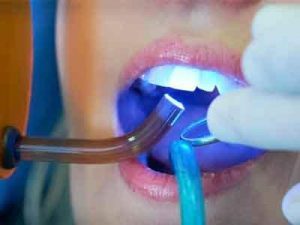- Home
- Editorial
- News
- Practice Guidelines
- Anesthesiology Guidelines
- Cancer Guidelines
- Cardiac Sciences Guidelines
- Critical Care Guidelines
- Dentistry Guidelines
- Dermatology Guidelines
- Diabetes and Endo Guidelines
- Diagnostics Guidelines
- ENT Guidelines
- Featured Practice Guidelines
- Gastroenterology Guidelines
- Geriatrics Guidelines
- Medicine Guidelines
- Nephrology Guidelines
- Neurosciences Guidelines
- Obs and Gynae Guidelines
- Ophthalmology Guidelines
- Orthopaedics Guidelines
- Paediatrics Guidelines
- Psychiatry Guidelines
- Pulmonology Guidelines
- Radiology Guidelines
- Surgery Guidelines
- Urology Guidelines
New smart dental filling material that prevents recurrent Caries

Researchers have designed a new smart dental filling material with tiny particles containing antimicrobial drugs which stops bacterial growth in its tracks and prevents recurrent Caries which is a cause of substantial yearly economic burden on health budget of US to the tune of US$34 billion.The new smart material has been developed by Department of Materials Science & Engineering, Faculty of Dentistry, and the Institute of Biomaterials and Biomedical Engineering at the University of Toronto.
In a recent paper published in the journal Scientific Reports, professors Ben Hatton, Yoav Finer and PhD student Cameron Stewart tackled the issue and proposed a novel solution: a filling material with tiny particles made by self-assembly of antimicrobial drugs, designed to stop bacteria in its tracks. These particles may solve one of the biggest problems with antibacterial filling materials: how do you store enough drug within the material to be effective for someone's entire life?
"Adding particles packed with antimicrobial drugs to a filling creates a line of defense against cavity-causing bacteria," says Hatton. "But traditionally there's only been enough drug to last a few weeks. Through this research we discovered a combination of drugs and silica glass that organize themselves on a molecule-by-molecule basis to maximize drug density, with enough supply to last years." This discovery of using antimicrobials which self-assemble means the team can pack 50 times as much of the bacteria-fighting drugs into the particles.
"We know very well that bacteria specifically attack the margins between fillings and the remaining tooth to create cavities," says Finer. "Giving these materials an antimicrobial supply that will last for years could greatly reduce this problem."
Looking ahead, the research team plans on testing these new drug-storing particles in dental fillings, monitoring their performance when attacked by bacteria and saliva in the complex environment in the mouth. With some fine-tuning, this new 'smart' material could create a stronger filling and fewer trips to the dentist.

Disclaimer: This site is primarily intended for healthcare professionals. Any content/information on this website does not replace the advice of medical and/or health professionals and should not be construed as medical/diagnostic advice/endorsement or prescription. Use of this site is subject to our terms of use, privacy policy, advertisement policy. © 2020 Minerva Medical Treatment Pvt Ltd